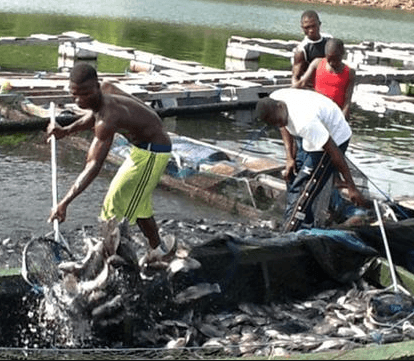Ghana to tighten efforts at managing fisheries sector
 A National fisheries Co-Management Policy is being developed to be passed into an Act by the middle of the year, to help rejuvenate the fishing sector and to sustain fisheries resources in the country.
A National fisheries Co-Management Policy is being developed to be passed into an Act by the middle of the year, to help rejuvenate the fishing sector and to sustain fisheries resources in the country.
When passed into law, that policy would allow the fishermen, the chief fishermen, and the chiefs and elders of the communities to assist governments officials at the Fisheries Commission (FC) to codify local laws and to enforce the fishing laws, especially within the fishing communities.
The District Assemblies would also be engaged to pass some by-laws to help fight the illegalities in the fishing sector as well as protect the fisheries resources like mangroves, estuaries, closed seasons and fishing holidays.
Co-management has been recognised as a global best practice to sustain fisheries resources contributions to national and local economies and food security.
Ghana’s Co-management policy which had gone through the stakeholder engagement stage, would soon be presented to Cabinet for approval and then for onward submission to Parliament for it passage into Law by June, Mr Francis Kingsley Cudjoe, Deputy Minister of Fisheries and Aquaculture Development (MoFAD) announced this in Takoradi.
Mr Cudjoe made the announcement at a three-day media event outreach programme currently ongoing in Takoradi, aimed to highlight the work of the United States Agency for International Development (USAID) and the MoFAD in helping to sustain Ghana’s fishery sector that was experiencing declining fish catches and increasing reliance on fish imports to meet demand.
The Deputy Minister said despite the many efforts by the Government and its partners to do away with illegal fishing, fishermen continued to engaged in the illegalities like light fishing, use of monofilament to fish, and dynamite or DDT fishing.
He stated that the issue of Saiko , which he called “galamsey on the high seas” where trawlers which are licensed to do bottom trawling go to sea and do upper water trawling, catch the upper water fish and sell them on the sea, should get all Ghanaians worried.
The upper water fishing had been designated for local fishermen to catch the pelagic while the bottom water have been earmarked for the trawlers, which were mostly managed by foreigners.
“The Trawlers that are supposed to do upper trawling now tends to do bottom trawling and then because they are not licensed to land with those fish they sell them at sea”.
Mr Cudjoe said there have been estimate that about 600 million dollars are taken away every year through the activities of Saiko, which was not too good for the fishers and the country in general.
He said the Government was not relenting in its efforts in dealing with the issues by enforcing the existing laws of arresting illegal operators, saying that out of the over 94 active vessels that were operating on the sea before the current administration took over, there was now 70 that are allowed to operate.
The others who were found to be floating the laws and dealing in illegality on the sea have had their licences withdrawn from them and stopped from operating, he noted.
Also, Mr Cudjoe revealed that 100 observers had been trained and were being positioned on all the vessels while video cameras have been put on some of the vessels as well so that “the eyes” of the Fisheries Commission would be on the sea for proper monitoring of activities of the vessels.
He said the artisanal fishers were also being monitored through the newly introduced fishers watch volunteers, made up of the fishermen themselves, who have volunteered to form some kind of watchdog group in the fishing communities and enforce some of the laws, that also fall under the co-management policy.
The USAID through the U.S. Government Feed the Future Ghana Sustainable Fisheries Management Project (SFMP) has been collaborating with the sector Ministry and the Fisheries Commission (FC) to implement a five-year SFMP project that was aimed at helping to rebuild fish stocks in Ghana and aid the food security agenda.
Currently, fisheries is estimated to contribute 60 per cent to total protein uptake nationally, and much higher in coastal communities.
The three and a half year-old SFMP fisheries food security project, funded by the USAID, housed within the Feed the Future Programme of the U.S. Government, seeks to help Ghanaians to rebuild targeted marine fisheries stocks such as sardines, anchovies and mackerel that were critical to local food security.
These fish directly support the livelihoods of about 130,000 fishers, over 30,000 fish processors, mostly women, as well as providing a larger part of protein intake across Ghana.
As part of the media event, the media personnel are touring the Rivers Pra and Ankobra Estuaries in the Western Region to interact and see model community-based fisheries management actions in line with the draft National Co-Management Policy now being considered by government.
Source: GNA
